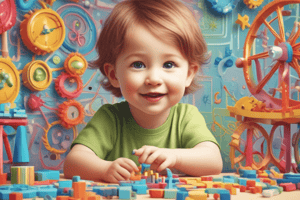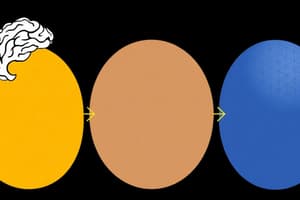Podcast
Questions and Answers
What is the ability to maintain consistent behavioral response during continuous and repetitive activities called?
What is the ability to maintain consistent behavioral response during continuous and repetitive activities called?
- Sustained attention (correct)
- Selective attention
- Alternating attention
- Divided attention
Which type of play involves children engaging in separate activities while exchanging toys and commenting on each other's behavior?
Which type of play involves children engaging in separate activities while exchanging toys and commenting on each other's behavior?
- Constructive play
- Cooperative play
- Functional play
- Associative play (correct)
What does divided attention refer to?
What does divided attention refer to?
- Responding simultaneously to multiple task demands (correct)
- Attending to the same object as another person
- Maintaining behavior in face of distractions
- Shifting focus between tasks
What type of memory allows storage for an unlimited period of time?
What type of memory allows storage for an unlimited period of time?
Which type of play is characterized by creating or constructing something, especially common between ages 3-6?
Which type of play is characterized by creating or constructing something, especially common between ages 3-6?
Which of the following best describes implicit memory?
Which of the following best describes implicit memory?
What is required for a child to engage in the zone of proximal development?
What is required for a child to engage in the zone of proximal development?
Which type of memory is primarily associated with retrieving past personal life experiences?
Which type of memory is primarily associated with retrieving past personal life experiences?
What happens to information in short term memory if it is not concentrated on?
What happens to information in short term memory if it is not concentrated on?
In-group favoritism in children generally leads to which of the following?
In-group favoritism in children generally leads to which of the following?
What is working memory particularly known for?
What is working memory particularly known for?
Which attentional capacity allows an individual to shift focus and move between tasks?
Which attentional capacity allows an individual to shift focus and move between tasks?
What aspect of memory does recall memory emphasize?
What aspect of memory does recall memory emphasize?
Which type of play is particularly associated with simple and repetitive motor movements during the first 2 years?
Which type of play is particularly associated with simple and repetitive motor movements during the first 2 years?
At what age are children best able to filter out irrelevant stimuli?
At what age are children best able to filter out irrelevant stimuli?
Which type of attention allows someone to respond to specific auditory stimuli?
Which type of attention allows someone to respond to specific auditory stimuli?
What is the focus of secondary circular reactions in infants aged 4 to 8 months?
What is the focus of secondary circular reactions in infants aged 4 to 8 months?
What characterizes experience-expectant brain growth?
What characterizes experience-expectant brain growth?
At what age range does mental representation emerge according to sensorimotor stages?
At what age range does mental representation emerge according to sensorimotor stages?
Which of the following best describes object permanence?
Which of the following best describes object permanence?
Which stage involves an infant demonstrating intentional goal-directed behavior?
Which stage involves an infant demonstrating intentional goal-directed behavior?
What are the three parts of the mental system for information processing?
What are the three parts of the mental system for information processing?
Which gross motor skill usually develops last among the options listed?
Which gross motor skill usually develops last among the options listed?
What role does the central executive play in cognitive processes?
What role does the central executive play in cognitive processes?
Flashcards
Effortful Processing
Effortful Processing
The process of consciously attending to and processing information, requiring active effort.
Sensory Registry
Sensory Registry
A brief storage system that holds sensory information for a fraction of a second. This is where sights and sounds are initially processed.
Selective Attention
Selective Attention
The ability to selectively focus on relevant information while ignoring distractions.
Short Term Memory
Short Term Memory
Signup and view all the flashcards
Working Memory
Working Memory
Signup and view all the flashcards
Long Term Memory
Long Term Memory
Signup and view all the flashcards
Explicit Memory
Explicit Memory
Signup and view all the flashcards
Implicit Memory
Implicit Memory
Signup and view all the flashcards
Sustained Attention
Sustained Attention
Signup and view all the flashcards
Alternating Attention
Alternating Attention
Signup and view all the flashcards
Divided Attention
Divided Attention
Signup and view all the flashcards
Joint Attention
Joint Attention
Signup and view all the flashcards
Parallel Play
Parallel Play
Signup and view all the flashcards
Associative Play
Associative Play
Signup and view all the flashcards
Cooperative Play
Cooperative Play
Signup and view all the flashcards
Primary Circular Reactions (1-4 months)
Primary Circular Reactions (1-4 months)
Signup and view all the flashcards
Secondary Circular Reactions (4-8 months)
Secondary Circular Reactions (4-8 months)
Signup and view all the flashcards
Coordination of Secondary Circular Reactions (8-12 months)
Coordination of Secondary Circular Reactions (8-12 months)
Signup and view all the flashcards
Tertiary Circular Reactions (12-18 months)
Tertiary Circular Reactions (12-18 months)
Signup and view all the flashcards
Mental Representation (18 months-2 years)
Mental Representation (18 months-2 years)
Signup and view all the flashcards
Experience-Expectant Brain Growth
Experience-Expectant Brain Growth
Signup and view all the flashcards
Experience-Dependent Brain Growth
Experience-Dependent Brain Growth
Signup and view all the flashcards
Object Permanence
Object Permanence
Signup and view all the flashcards
Study Notes
Sensorimotor Stages
- Reflexive schemes: Birth to 1 month. Infants exhibit reflexes.
- Primary circular reactions: 1-4 months. Infants repeat simple motor actions centered on their own bodies.
- Secondary circular reactions: 4-8 months. Infants repeat actions that affect the environment.
- Coordination of secondary circular reactions: 8-12 months. Intentional goal-directed behaviors emerge.
- Tertiary circular reactions: 12-18 months. Exploration of object properties through experimentation.
- Mental representation: 18-24 months. Internal depictions of objects and events; problem-solving.
Brain Growth
- Experience-expectant brain growth: Early brain development dependent on ordinary experiences.
- Exploration, interaction with people, and exposure to language are crucial.
- Experience-dependent brain growth: Lifelong growth and refinement of existing brain structures due to specific learning experiences.
- Experiences like reading, playing, or practicing music influence brain development.
Cognitive Principles and Theories
- Object permanence: Awareness that objects continue to exist even when out of sight.
- Central executive/executive functioning: Directs information flow and enables complex thinking.
- Information processing: Three-part mental system for processing information:
- Sensory register: Initial information processing.
- Short-term memory: Briefly holds information.
- Long-term memory: Permanent storage.
Sensory Registry
- Sensory information (sights and sounds) is initially represented and briefly stored.
- Enhanced attention leads to better transfer to short-term memory.
Memory
- Short-term memory: Information from sensory memory enters conscious processing.
Attention
- Focus attention: Responding to specific stimuli (visual, auditory, or tactile).
- Sustained attention: Maintaining consistent responses during continuous activities.
- Selective attention: Focusing on stimuli while ignoring distractions.
- Alternating attention: Switching between tasks.
- Divided attention: Performing multiple tasks simultaneously.
- Joint attention: Sharing attention with another person on a common object or event.
Levels of Play
- Parallel play: Children play near each other but do not interact.
- Associative play: Children engage in separate activities but share toys and materials.
- Cooperative play: Children work together toward common goals.
- Functional play: Simple, repetitive movements with or without objects, common in toddlers.
- Constructive play: Creating or constructing objects, common in preschoolers.
- Make-believe play: Acting out roles or situations, common in pre-school age children.
Social Structures
- In-group favoritism: Children show preference for their own group.
- Out-group prejudice: Negative attitudes towards groups other than their own, can develop early.
Studying That Suits You
Use AI to generate personalized quizzes and flashcards to suit your learning preferences.




